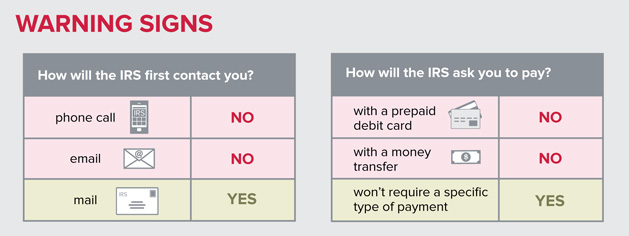It’s that time of year — TAX TIME! And tax-related identity theft is on the rise. Scammers have gotten really good at stealing people’s Social Security numbers and fraudulently claiming their refund. The IRS tries to combat this crime with an aggressive strategy of prevention, detection and victim assistance, but the best way for you to protect yourself if to stay informed.
Types of Scams:
Tax identity Theft – This kind of identity theft happens when someone files a fake tax return using your personal information — like your Social Security number — to get a tax refund or a job.
IRS Imposter Scams – This time scammers aren’t pretending to be you — they’re posing as the IRS. They call or email you saying you owe taxes, and threaten to arrest you if you don’t pay right away.
 The real IRS won’t contact you over the phone or through email and will never ask you to pay with prepaid debit cards or wire transfers.
The real IRS won’t contact you over the phone or through email and will never ask you to pay with prepaid debit cards or wire transfers.
Signs You’ve Been a Victim
If someone has stolen your SSN to file a forged tax return, you may be unaware it’s even happened until you receive a letter from the IRS that states:
- More than one tax return was filed by you
- You owe additional tax, have a refund offset or have had collection actions taken against you for a year you did not file a tax return
- IRS records indicate you received wages from an employer unknown to you.
Steps to Repair Your Information
If your SSN is compromised and you know or suspect that you are victim of tax-related identity theft, report the fraud by contacting the IRS Identity Protection Specialized Unit at 800-908-4490 and send a copy of your police report of an IRS ID Theft Affidavit Form 14039 and proof of your identity (such as a copy of your Social Security Card, driver’s license or passport).
You’ll want to limit the potential damage of the theft by putting a fraud alert on your credit reports. Contact one of the credit bureaus: Equifax, Experian, or TransUnion.
Reduce Your Risk
Lessen your chances of being a victim by:
- Filing your tax return early in the season, before identity thieves do
- Using a secure Internet connection if you file electronically. Don’t use unsecure, publicly available Wi-Fi hotspots
- Mailing your tax return directly from the post office
- Shredding copies of your tax return, drafts, or calculation sheets you no longer need
- Knowing the IRS won’t contact you by email, text, or social media. If the IRS needs information, it will first contact you by mail.
Learn more at ftc.gov/taxidtheft and irs.gov/identitytheft.




